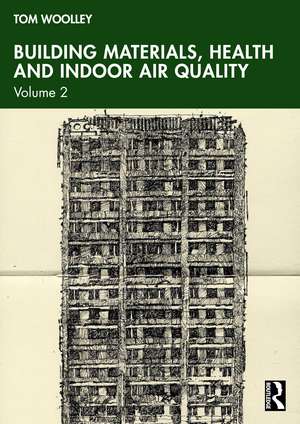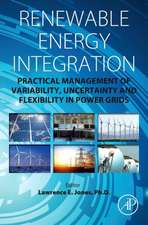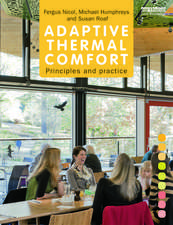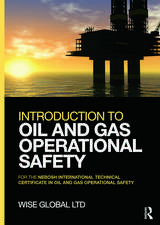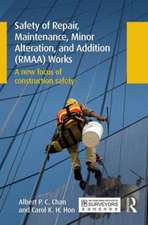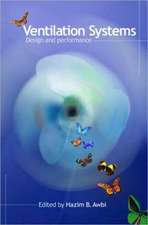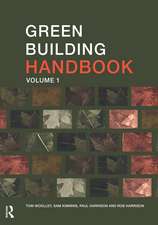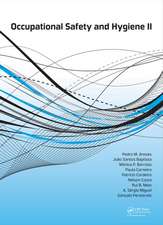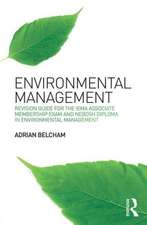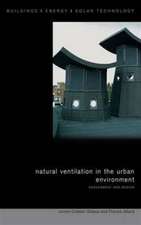Building Materials, Health and Indoor Air Quality: Volume 2
Autor Tom Woolleyen Limba Engleză Paperback – 23 mai 2024
- Further evidence of the health impacts of hazardous emissions from materials
- Hazardous materials to be avoided and why
- Fire and smoke toxicity – the Lakanal House and Grenfell Tower legacy
- Sub-standard retrofits leading to damp and mould in previously sound houses
- A critical review of recent reports from UK Government and others on air quality and health problems including policy changes on flame retardants
- Growing evidence of cancer risks and the failure of cancer research organisations to address these issues
- A critical review of recent climate change and zero carbon policies and a discussion on whether extreme energy efficiency is a good thing
| Toate formatele și edițiile | Preț | Express |
|---|---|---|
| Paperback (2) | 363.93 lei 3-5 săpt. | +21.78 lei 6-12 zile |
| CRC Press – 23 mai 2024 | 363.93 lei 3-5 săpt. | +21.78 lei 6-12 zile |
| CRC Press – 29 sep 2016 | 443.31 lei 6-8 săpt. | |
| Hardback (2) | 988.54 lei 6-8 săpt. | |
| CRC Press – 27 sep 2016 | 988.54 lei 6-8 săpt. | |
| CRC Press – 23 mai 2024 | 1054.71 lei 6-8 săpt. |
Preț: 363.93 lei
Nou
Puncte Express: 546
Preț estimativ în valută:
69.64€ • 72.86$ • 57.85£
69.64€ • 72.86$ • 57.85£
Carte disponibilă
Livrare economică 13-27 martie
Livrare express 26 februarie-04 martie pentru 31.77 lei
Preluare comenzi: 021 569.72.76
Specificații
ISBN-13: 9780367646691
ISBN-10: 0367646692
Pagini: 234
Ilustrații: 4
Dimensiuni: 174 x 246 x 17 mm
Greutate: 0.43 kg
Ediția:1
Editura: CRC Press
Colecția Routledge
Locul publicării:Boca Raton, United States
ISBN-10: 0367646692
Pagini: 234
Ilustrații: 4
Dimensiuni: 174 x 246 x 17 mm
Greutate: 0.43 kg
Ediția:1
Editura: CRC Press
Colecția Routledge
Locul publicării:Boca Raton, United States
Public țintă
Postgraduate, Professional, and Professional Practice & DevelopmentCuprins
Acknowledgements
Chapter 1: Introduction
Chapter 2: Chemicals in building materials
Chapter 3: Emissions from building materials and health impacts
Chapter 4: UK, EU and WHO policies on indoor air quality
Chapter 5: Damp, mould, building materials and retrofit
Chapter 6: Ventilation and personal contaminants
Chapter 7: Testing for indoor air quality
Chapter 8: Healthy building, greenwashing and wellwashing
Chapter 9: Afterthoughts
Chapter 1: Introduction
Chapter 2: Chemicals in building materials
Chapter 3: Emissions from building materials and health impacts
Chapter 4: UK, EU and WHO policies on indoor air quality
Chapter 5: Damp, mould, building materials and retrofit
Chapter 6: Ventilation and personal contaminants
Chapter 7: Testing for indoor air quality
Chapter 8: Healthy building, greenwashing and wellwashing
Chapter 9: Afterthoughts
Notă biografică
Professor Tom Woolley is an architect with extensive practice experience in Scotland and London, specialising in the renovation of old buildings and working with community groups. He is former Professor of Architecture at Queens University, Belfast, Editor of the award- winning Green Building Digest, and former Chairman of the Northern Ireland Building Regulations Advisory Committee and former member of the Ministerial Advisory Committee. He is the author of numerous books including Building Materials, Health and Indoor Air Quality, Routledge, 2016.
Descriere
In the follow up to Building Materials, Health and Indoor Air Quality, Tom Woolley uses new research to continue to advocate for limiting the use of hazardous materials in construction and raise awareness of the links between pollutants found in building materials, poor indoor air quality and health problems.
Recenzii
"The book offers a phenomenally well-researched and worrying insight into the indoor air quality issues that hazardous substances create."
—Health and Safety at Work, March 2017
As industry and regulation increasingly focus on energy and carbon saving to fulfil our environmental responsibility, this book is a timely reminder that the quality of the buildings we occupy has to be given the same importance as energy performance. In this book Professor Woolley revisits his previous excellent research in toxicity and materials by delivering a book that will be vital in addressing the issues of health and our built environment for practitioners and students alike.
Alison Pooley, Anglia Ruskin University
For quite some time issues of the outdoor environment and climate change have overshadowed the issue of indoor air quality. Woolley presents a range of evidence showing that the indoor air quality problem remains highly pertinent, and largely ignored not only by public authorities and the construction industry, but also unfortunately by several health - and environmental organizations.
Modern solutions for energy efficient buildings, such as the passive house, potentially amplify this problem through increased focus on impermeability, new insulation materials and balanced ventilation system with heat recovery.
But Woolley shows us the way forward. He documents with great experience and thoroughness that there is no contradiction between high energy efficiency and good indoor air quality. Proposed solutions include the use of low-emitting materials, hygroscopic surfaces and natural ventilation.
This knowledge is deeply valuable to anyone interested in indoor air quality.
Bjørn Berge, Gaia Architects
A powerful plea to to make better choices about the products we use and the way we build. This book is a wake-up call for anyone who believes it possible to deliver healthy buildings without challenging the dependence on complex industrial chemicals.
Gary Newman, Alliance for Sustainable Building Products
"The book offers a phenomenally well-researched and worrying insight into the indoor air quality issues that hazardous substances create."
Health and Safety at Work, March 2017
—Health and Safety at Work, March 2017
As industry and regulation increasingly focus on energy and carbon saving to fulfil our environmental responsibility, this book is a timely reminder that the quality of the buildings we occupy has to be given the same importance as energy performance. In this book Professor Woolley revisits his previous excellent research in toxicity and materials by delivering a book that will be vital in addressing the issues of health and our built environment for practitioners and students alike.
Alison Pooley, Anglia Ruskin University
For quite some time issues of the outdoor environment and climate change have overshadowed the issue of indoor air quality. Woolley presents a range of evidence showing that the indoor air quality problem remains highly pertinent, and largely ignored not only by public authorities and the construction industry, but also unfortunately by several health - and environmental organizations.
Modern solutions for energy efficient buildings, such as the passive house, potentially amplify this problem through increased focus on impermeability, new insulation materials and balanced ventilation system with heat recovery.
But Woolley shows us the way forward. He documents with great experience and thoroughness that there is no contradiction between high energy efficiency and good indoor air quality. Proposed solutions include the use of low-emitting materials, hygroscopic surfaces and natural ventilation.
This knowledge is deeply valuable to anyone interested in indoor air quality.
Bjørn Berge, Gaia Architects
A powerful plea to to make better choices about the products we use and the way we build. This book is a wake-up call for anyone who believes it possible to deliver healthy buildings without challenging the dependence on complex industrial chemicals.
Gary Newman, Alliance for Sustainable Building Products
"The book offers a phenomenally well-researched and worrying insight into the indoor air quality issues that hazardous substances create."
Health and Safety at Work, March 2017
